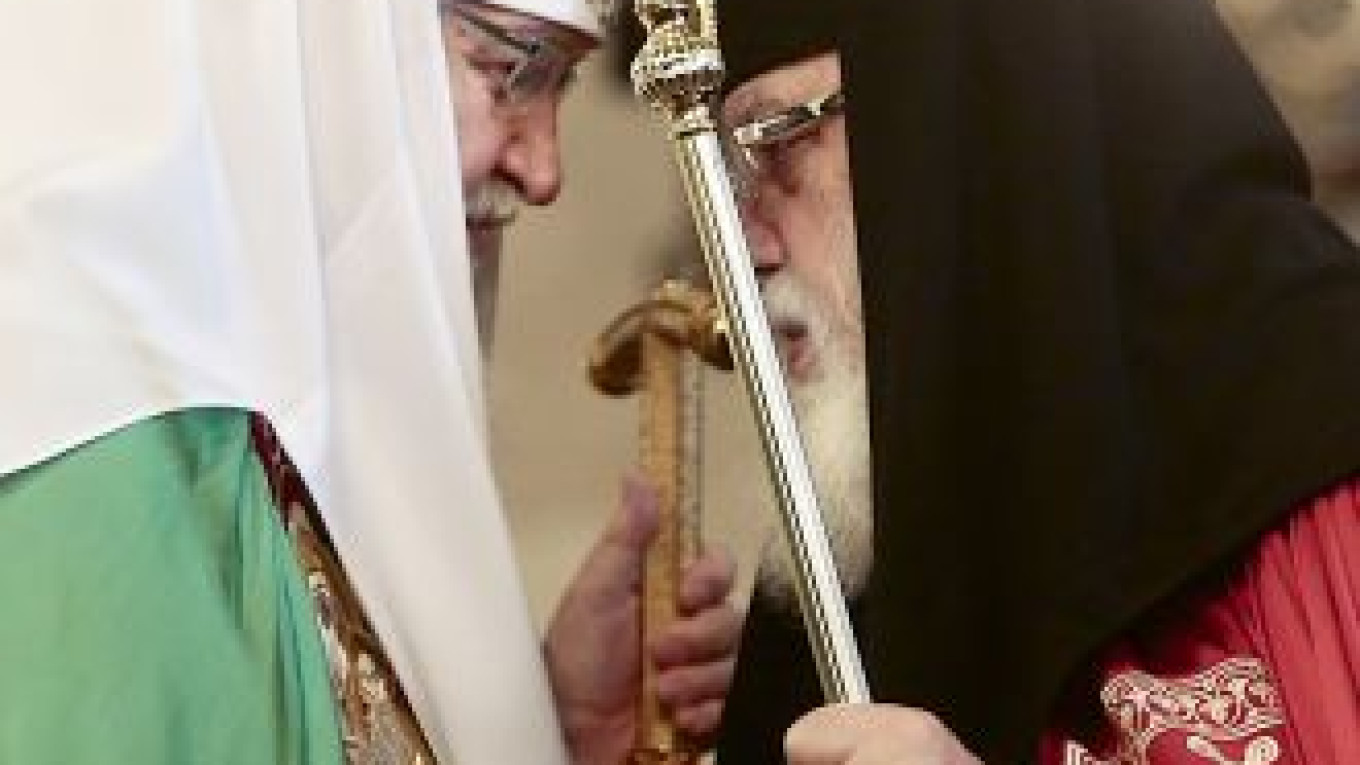Georgia's Patriarch Ilya, on a rare trip to Russia, is due to meet President Vladimir Putin on Wednesday and says he is optimistic about future relations between the two nations.
One of the most prominent Georgians to visit Russia since the war, the leader of the Georgian Orthodox Church received an award from his Russian Orthodox counterpart, Patriarch Kirill, a move analysts said used the politically powerful churches to help improve the countries' ties.
"The brotherly relations between our churches were the only path that connected our governments and people," he said, Interfax reported, referring to time after the war.
"I think that our visit will serve mutual understanding and the strengthening of our brotherly relations between our people, and those problems that exist between our governments will be resolved positively," he told Kirill.
Russia and Georgia severed diplomatic ties due to the war, which followed years of tension over Moscow's support for two rebel regions and Georgian President Mikheil Saakashvili's drive to bring his nation into NATO.
Last year, billionaire politician Bidzina Ivanishvili, who earned much of his fortune in Russia, and his Georgian Dream coalition won parliamentary elections, driving Saakashvili's party from power.
Many Georgians say they want better relations with Moscow after years of Saakashvili's anti-Russia policies.
Political analyst Dmitry Oreshkin said the use of the Russian Orthodox Church to help strengthen ties played into Putin's strategy of giving it a more powerful role in daily life in Russia and acting as a glue to cement ties through parts of the former Soviet Union.
"This [visit] will be used by the Kremlin to unite the people [of Russia and Georgia] spiritually, all part of a broader strategy to set up a new old ideological structure for the former Soviet republics. This perfectly fits into Putin's strategy of rebuilding a post-Soviet 'neo-USSR,'" he said.
Putin first mentioned "spiritual ties" as a means to bring Russian society together in his state-of-the-nation address last month to parliament, his first since a presidential election returned him to the top seat of power in the Kremlin.
Putin, a former Soviet KGB officer, has cultivated close ties with the Russian Orthodox Church in 13 years in power and has leaned more on it for support since starting his third term as president in May following protests against his rule.
A Georgian negotiator said last month that the two countries had set out a blueprint for the partial restoration of ties at their first direct talks about bilateral relations since the war over rebel regions South Ossetia and Abkhazia.
Related articles:
A Message from The Moscow Times:
Dear readers,
We are facing unprecedented challenges. Russia's Prosecutor General's Office has designated The Moscow Times as an "undesirable" organization, criminalizing our work and putting our staff at risk of prosecution. This follows our earlier unjust labeling as a "foreign agent."
These actions are direct attempts to silence independent journalism in Russia. The authorities claim our work "discredits the decisions of the Russian leadership." We see things differently: we strive to provide accurate, unbiased reporting on Russia.
We, the journalists of The Moscow Times, refuse to be silenced. But to continue our work, we need your help.
Your support, no matter how small, makes a world of difference. If you can, please support us monthly starting from just $2. It's quick to set up, and every contribution makes a significant impact.
By supporting The Moscow Times, you're defending open, independent journalism in the face of repression. Thank you for standing with us.
Remind me later.


